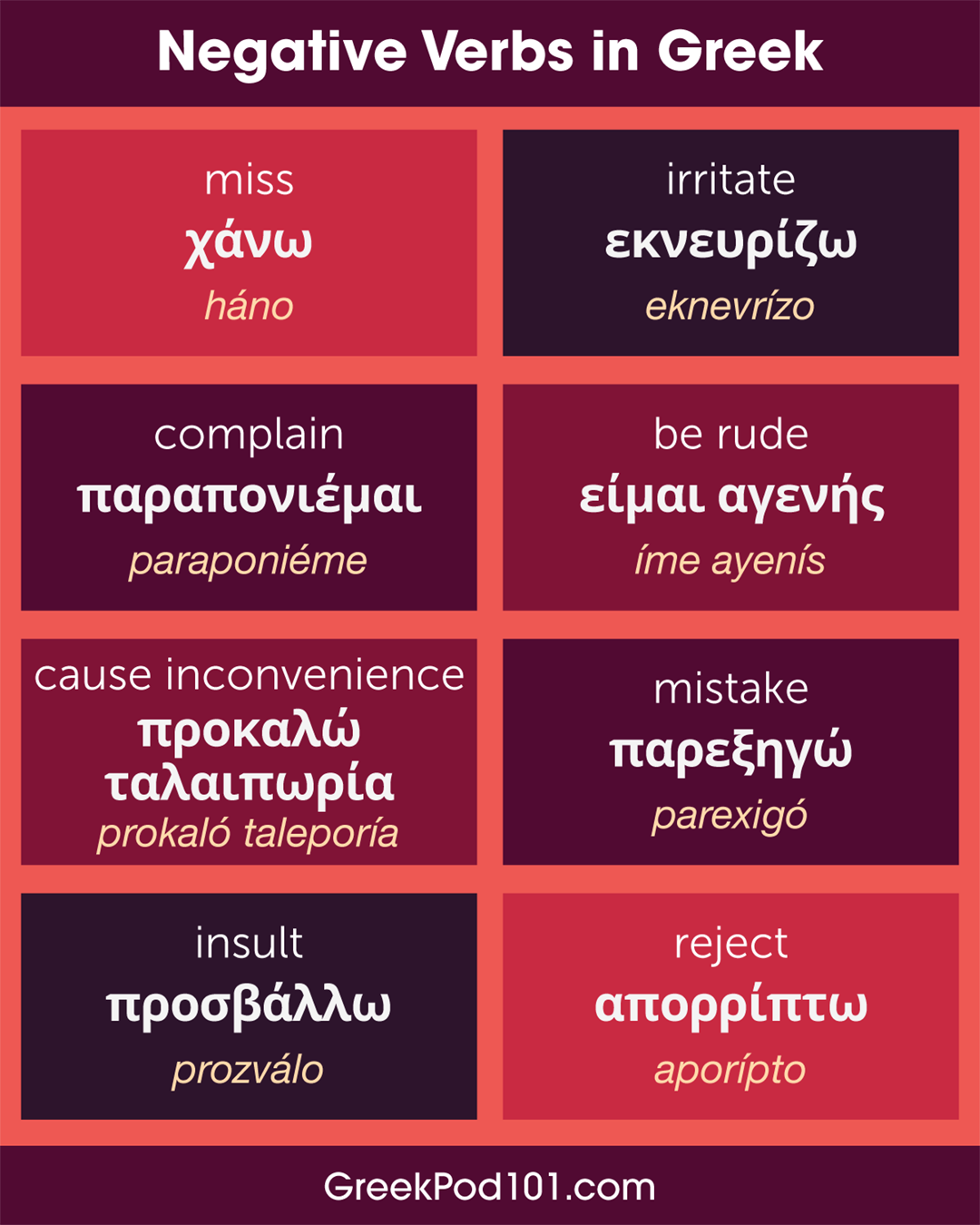People in Greece might be welcoming, generous, and hospitable. However, they can also be pretty tense. A walk around Athens can resolve all your doubts. You’ll definitely encounter some people shouting at each other while driving, or even groups of teenagers arguing about their favorite artist.
This is a characteristic of almost all cultures around the Mediterranean Sea. Greek culture closely resembles those of the Italian and the Spanish. However, this phenomenon normally can’t be characterized as anger; it’s really just vivid talking. In this article, we’ll be going over the Greek word for anger, as well as how to express negative emotions in Greek.
Anger is an emotion that Greeks have tried to understand and explain since ancient times. The concept of anger is prominent in ancient Greek mythology, as the 12 Gods of Olympus showcased the same behavioral traits as the mortals. Indeed, they could be jealous, intimidated, and even angered—and believe me, you don’t want to see an angry Greek god!
When a thunderstorm hit, Greeks perceived it as an expression of Zeus’s anger. Within the same context, a storm at sea was believed to be the release of tension of Poseidon, the God of the Seas. As for earthquakes, there was the angry God Enceladus, one of the Giants, who made the Earth shiver due to his bad temper.
In the Homeric epics Iliad and Odyssey, anger is the reason for war and many other bad things that happen to the heroes. Since antiquity, it was believed that anger could make a man “blind” in the sense that he would be unable to think and act straight, thus leading to poor decision-making. One of Aristotle’s most-known quotes is:
“Anybody can become angry—that is easy, but to be angry with the right person and to the right degree and at the right time and for the right purpose, and in the right way—that is not within everybody’s power and is not easy.”
From ancient Greece until today, anger is always present in our lives.
-
→ For information on how to put other feelings into Greek words, check out our useful lesson on GreekPod101.com.
So, how is anger in modern Greek culture? Well, here’s the word for “anger” in Greek:
Greek: (o) θυμός
Romanization: thimós
Translation: “anger” (masculine)
This is a masculine noun, but there’s also a feminine noun that you can use for more intense anger:
Greek: (η) οργή
Romanization: oryí
Translation: “rage” (feminine)
In this article, we’ll demonstrate some of the most common angry Greek phrases and expressions. Nevertheless, we don’t encourage you to use them frequently, because who wants to be angry, after all?
- Angry Imperatives
- Angry Warnings
- Angry Blames
- Describing How You Feel
- How to Calm Someone Down
- Conclusion
1. Angry Imperatives
Imperatives can be rude. So, while we don’t advise the use of the following phrases, it’s always good to know a thing or two—just in case. As you might notice, the phrases used are pretty similar to the English ones, which makes them easier to remember.
- Greek: Σκάσε!
- Romanization: Skáse!
- Translation: “Shut up!”
- Example Situation: When someone is talking constantly and you can’t stand it anymore.
- Additional Notes: This is an imperative form of the verb σκάω (skáo). This phrase is considered particularly rude and you should avoid using it.
- Greek: Άντε / Άι χάσου!
- Romanization: Áde / Ái hásu!
- Translation: “Get lost!”
- Example Situation: When someone has angered you so much that you can’t stand seeing him/her.
- Additional Notes: This is an imperative form of the verb χάνομαι (hánome), meaning “to get lost.” The first word, άντε, which is often used as άι, is an interjection and acts as a prompt meaning “go ahead” or “go on.” This is another phrase that should be avoided, as it’s considered pretty rude.
You’re probably wondering “Avoid this…avoid that…which phrase can I actually use when I’m angry?” Here are some milder examples of ways to express that you’re angry in Greek:
- Greek: Σταμάτα!
- Romanization: Stamáta!
- Translation: “Stop (it)!”
- Example Situation: When someone does something annoying.
- Additional Notes: This is an imperative form of the verb σταματάω / σταματώ (stamatáo / stamató), meaning “to stop.”
- Greek: Κόφ’ το!
- Romanization: Kóf’ to!
- Translation: “Cut it out!”
- Example Situation: When someone does something annoying.
- Additional Notes: The first word comes from the verb κόβω (kóvo), meaning “to cut,” which has been contracted before the pronoun το (to). το (to) means “it” and serves as an object here, due to a phonological phenomenon called apocope. Keep in mind that this is a slang expression, so it’s more suitable in casual situations.
- Greek: Παράτα με!
- Romanization: Paráta me!
- Translation: “Leave me alone!”
- Example Situation: When someone keeps talking to you or keeps doing something annoying.
- Additional Notes: This is an imperative form of the verb παρατάω / παρατώ (paratáo / parató), which means “abandon” / “quit” / “leave.” The word με is the weak form of the personal pronoun εμένα (eména), meaning “me” in the accusative.
-
→ Check out our lesson on making negative Greek commands for additional information on this topic!
2. Angry Warnings
Warning someone can be a good tactic to avoid becoming angry in the first place. These are some phrases you can use to make your point as clear as the Greek blue sky.
- Greek: Μην ανακατεύεσαι!
- Romanization: Min anakatévese!
- Translation: “Stay out of it!”
- Example Situation: When someone gets in the way or intervenes on a matter that doesn’t concern them.
- Greek: Δεν θέλω να σε ξαναδώ.
- Romanization: Den thélo na se xanadó.
- Translation: “I don’t want to see you again.”
- Example Situation: When you break up with someone.
- Greek: Μη με κάνεις να το ξαναπώ.
- Romanization: Mi me kánis na to xanapó.
- Translation: “Don’t make me say it again.”
- Example Situation: When you’ve said something over and over again, but the other individual doesn’t go along with it.
- Greek: Δεν θα το ανεχτώ!
- Romanization: Den tha to anehtó!
- Translation: “I won’t tolerate that!”
- Example Situation: When something happens that goes well and beyond your limits.
3. Angry Blames
We couldn’t leave angry blames out of this list. This is simply because the phrases below can be used to set your limits, express your anger about a situation that’s beyond your control, or make a point clear.
- Greek: Μα καλά, τι σκεφτόσουν;
- Romanization: Ma kalá, ti skeftósun?
- Translation: “What were you thinking?”
- Example Situation: When someone does something so stupid that you can’t even understand what led to this.
- Additional Notes: The phrase μα καλά literally means “But well.” However, its meaning here is different. It’s used as an exclamatory phrase to express surprise over something unthinkable.
- Greek: Εσύ φταις!
- Romanization: Esí ftés!
- Translation: “It’s your fault!”
- Example Situation: When someone does something bad.
- Greek: Ποιος νομίζεις πώς είσαι;
- Romanization: Pios nomízis pos íse?
- Translation: “Who do you think you are?”
- Example Situation: When someone acts in such a way that it suggests they think too highly of themselves.
- Greek: Αυτό που έκανες ήταν απαράδεκτο!
- Romanization: Aftó pu ékanes ítan aparádekto!
- Translation: “What you did was unacceptable!”
- Example Situation: When someone does something inappropriate.
- Greek: Είσαι τρελός / τρελή;
- Romanization: Íse trelós / trelí?
- Translation: “Are you crazy?”
- Example Situation: When someone does something crazy.
- Greek: Πας καλά;
- Romanization: Pas kalá?
- Translation: “Are you in your right mind?”
- Example Situation: When someone does something crazy and you think something is wrong with them. This expression literally means “Are you going well?” in the sense of “Are you functioning well (mentally)?”
-
→ Need more words and phrases? Check out our lesson on how to have an argument in Greek!
4. Describing How You Feel
Many people find it difficult to express their feelings. What you should keep in mind is that without expressing ourselves, others might misinterpret our actions or feelings. In many cases, being straightforward is a good move for avoiding anger. Here are some to-the-point phrases you can use to say “I am angry” in Greek, or to express other negative emotions:
- Greek: Είμαι πολύ θυμωμένος / θυμωμένη!
- Romanization: Íme polí thimoménos / thimoméni!
- Translation: “I am very angry!”
- Example Situation: When you’re very angry.
- Additional Notes: θυμωμένος is masculine and θυμωμένη is feminine.
- Greek: Έχω μπουχτίσει!
- Romanization: Ého buhtísi!
- Translation: “I am fed up!”
- Example Situation: When you feel like you can’t take it anymore.
- Additional Notes: The verb μπουχτίζω corresponds to the phrasal verb “feed up.”
- Greek: Ποτέ δεν έχω υπάρξει τόσο απογοητευμένος / απογοητευμένη.
- Romanization: Poté den ého ipárxi tóso apogoitevménos / apogoitevméni.
- Translation: “I’ve never been so disappointed.”
- Example Situation: When you feel deeply disappointed.
- Greek: Δεν μπορώ άλλο.
- Romanization: Den boró állo.
- Translation: “I can’t take it anymore.”
- Example Situation: When you feel you can’t take it anymore.
-
→ Learn the top 21 words for negative emotions with GreekPod101.com to better explain yourself.
5. How to Calm Someone Down
Calming someone down is not about charisma. It’s knowing what to say and when to say it. Here are some relevant examples of Greek phrases and expressions, which can be used for this purpose:
- Greek: Πάρε μια βαθιά ανάσα.
- Romanization: Páre mia vathiá anása.
- Translation: “Take a deep breath.”
- Example Situation: Trying to calm someone down who is very upset or in shock.
- Greek: Έλα, ηρέμησε.
- Romanization: Éla, irémise.
- Translation: “Come on, calm down.”
- Example Situation: Trying to calm someone down who is very upset.
- Greek: Πρέπει να προσπαθήσεις να ηρεμήσεις.
- Romanization: Prépi na prospathísis na iremísis.
- Translation: “You should try to calm down.”
- Example Situation: Suggesting to someone that being angry won’t do any good.
6. Conclusion
As the Greek historian Plutarch pointed out: “The characteristic of a wise man is the ability to avoid every conflict and anger.” This is indeed a wise move, although we understand that it can be difficult to stay calm in some situations.
That’s why we’ve outlined some of the most common Greek phrases and expressions related to anger—that feeling which can make you behave without thinking through all aspects of a situation.
In the end, our suggestion is the following: Every time you feel anger, just take a step back and breathe. Give it a second thought. Then, and only then, you can reach true wisdom.
However, if you feel the urge to speak, we’ve got you covered! At GreekPod101.com, we focus on practical learning, providing you with useful sentences, expressions, and word lists!
What do you do to calm down when angry?
Let us know in the comments!

















